- Home
- Studs Terkel
The Studs Terkel Reader_My American Century Page 9
The Studs Terkel Reader_My American Century Read online
Page 9
The meeting was moderated by a great big black guy who was bushy-headed. [Laughs.] That turned me off. He acted very nice. He said: “I want you all to feel free to say anything you want to say.” Some of the blacks stand up and say it’s white racism. I took all I could take. I asked for the floor and I cut loose. I said: “No sir, it’s black racism. If we didn’t have niggers in the schools, we wouldn’ t have the problems we got today.”
I will never forget. Howard Clements, a black guy, stood up. He said: “I’m certainly glad C. P. Ellis come because he’s the most honest man here tonight.” I said: “What’s that nigger tryin’ to do?” [Laughs.] At the end of that meeting, some blacks tried to come up shake my hand, but I wouldn’t do it. I walked off.
Second night, same group was there. I felt a little more easy because I got some things off my chest. The third night, after they elected all the committees, they want to elect a chairman. Howard Clements stood up and said: “I suggest we elect two co-chairpersons.” Joe Beckton, executive director of the Human Relations Commission, just as black as he can be, he nominated me. There was a reaction from some blacks. Nooo. And, of all things, they nominated Ann Atwater, that big old fat black gal that I had just hated with a purple passion, as co-chairman. I thought to myself: Hey, ain’t no way I can work with that gal. Finally, I agreed to accept it, ‘cause at this point, I was tired of fightin’, either for survival or against black people or against Jews or against Catholics.
A Klansman and a militant black woman, co-chairmen of the school committee. It was impossible. How could I work with her? But after about two or three days, it was in our hands. We had to make it a success. This give me another sense of belongin’, a sense of pride. This helped this inferiority feelin’ I had. A man who has stood up publicly and said he despised black people, all of a sudden he was willin’ to work with ’em. Here’s a chance for a low-income white man to be somethin’. In spite of all my hatred for blacks and Jews and liberals, I accepted the job. Her and I began to reluctantly work together. [Laughs.] She had as many problems workin’ with me as I had workin’ with her.
One night, I called her: “Ann, you and I should have a lot of differences and we got ‘em now. But there’s somethin’ laid out here before us, and if it’s gonna be a success, you and I are gonna have to make it one. Can we lay aside some of these feelin’s?” She said: “I’m willing if you are.” I said: “Let’s do it.”
My old friends would call me at night: “C. P., what the hell is wrong with you? You’re sellin’ out the white race.” This begin to make me have guilt feelin’s. Am I doin’ right? Am I doin’ wrong? Here I am all of a sudden makin’ an about-face and tryin’ to deal with my feelin’s, my heart. My mind was beginnin’ to open up. I was beginnin’ to see what was right and what was wrong. I don’t want the kids to fight forever.
We were gonna go ten nights. By this time, I had went to work at Duke University, in maintenance. Makin’ very little money. Terry Sanford give me this ten days off with pay. He was president of Duke at the time. He knew I was a Klansman and realized the importance of blacks and whites getting along.
I said: “If we’re gonna make this thing a success, I’ve got to get to my kind of people.” The low-income whites. We walked the streets of Durham, and we knocked on doors and invited people. Ann was goin’ into the black community. They just wasn’t respondin’ to us when we made these house calls. Some of‘em were cussin’ us out. “You’re sellin’ us out, Ellis, get out of my door. I don’t want to talk to you.” Ann was gettin’ the same response from blacks: “What are you doin’ messin’ with that Klansman?”
One day, Ann and I went back to the school and we sat down. We began to talk and just reflect. Ann said: “My daughter came home cryin’ every day. She said her teacher was makin’ fun of me in front of the other kids.” I said: “Boy, the same thing happened to my kid. White liberal teacher was makin’ fun of Tim Ellis’s father, the Klansman. In front of other peoples. He came home cryin’.” At this point—[he pauses, swallows hard, stifles a sob]—I begin to see, here we are, two people from the far ends of the fence, havin’ identical problems, except hers bein’ black and me bein’ white. From that moment on, I tell ya, that gal and I worked together good. I begin to love the girl, really. [He weeps.]
The amazing thing about it, her and I, up to that point, had cussed each other, bawled each other, we hated each other. Up to that point, we didn’t know each other. We didn’t know we had things in common.
We worked at it, with the people who came to these meetings. They talked about racism, sex education, about teachers not bein’ qualified. After seven, eight nights of real intense discussion, these people, who’d never talked to each other before, all of a sudden came up with resolutions. It was really somethin’, you had to be there to get the tone and feelin’ of it.
At that point, I didn’t like integration, but the law says you do this and I’ve got to do what the law says, okay? We said: “Let’s take these resolutions to the school board.” The most disheartening thing I’ve ever faced was the school system refused to implement any one of these resolutions. These were recommendations from the people who pay taxes and pay their salaries. [Laughs.]
I thought they were good answers. Some of ’em I didn’t agree with, but I been in this thing from the beginning, and whatever comes of it, I’m gonna support it. Okay, since the school board refused, I decided I’d just run for the school board.
I spent eighty-five dollars on the campaign. The guy runnin’ against me spent several thousand. I really had nobody on my side. The Klan turned against me. The low-income whites turned against me. The liberals didn’t particularly like me. The blacks were suspicious of me. The blacks wanted to support me, but they couldn’t muster up enough to support a Klansman on the school board. [Laughs.] But I made up my mind that what I was doin’ was right, and I was gonna do it regardless what anybody said.
It bothered me when people would call and worry my wife. She’s always supported me in anything I wanted to do. She was changing, and my boys were too. I got some of my youth corps kids involved. They still followed me.
I was invited to the Democratic women’s social hour as a candidate. Didn’t have but one suit to my name. Had it six, seven, eight years. I had it cleaned, put on the best shirt I had and a tie. Here were all this high-class wealthy candidates shakin’ hands. I walked up to the mayor and stuck out my hand. He give me that handshake with that rag type of hand. He said: “C. P., I’m glad to see you.” But I could tell by his handshake he was lyin’ to me. This was botherin’ me. I know I’m a low-income person. I know I’m not wealthy. I know they were sayin’: “What’s this little ol’ dude runnin’ for school board?” Yet they had to smile and make like they’re glad to see me. I begin to spot some black people in that room. I automatically went to ’em and that was a firm handshake. They said: “I’m glad to see you, C. P.” I knew they meant it—you can tell about a handshake.
Every place I appeared, I said I will listen to the voice of the people. I will not make a major decision until I first contacted all the organizations in the city. I got 4,640 votes. The guy beat me by two thousand. Not bad for eighty-five bucks and no constituency.
The whole world was openin’ up, and I was learnin’ new truths that I had never learned before. I was beginnin’ to look at a black person, shake hands with him, and see him as a human bein’. I hadn’t got rid of all this stuff. I’ve still got a little bit of it. But somethin’ was happenin’ to me.
It was almost like bein’ born again. It was a new life. I didn’t have these sleepless nights I used to have when I was active in the Klan and slippin’ around at night. I could sleep at night and feel good about it. I’d rather live now than at any other time in history. It’s a challenge.
Back at Duke, doin’ maintenance, I’d pick up my tools, fix the commode, unstop the drains. But this got in my blood. Things weren’t right in this country, and what we done in Durham needs to be told.
I was so miserable at Duke, I could hardly stand it. I’d go to work every morning just hatin’ to go.
My whole life had changed. I got an eighth-grade education, and I wanted to complete high school. Went to high school in the afternoons on a program called PEP—Past Employment Progress. I was about the only white in class, and the oldest. I begin to read about biology. I’d take my books home at night, ’cause I was determined to get through. Sure enough, I graduated. I got the diploma at home.
I come to work one mornin’ and some guy says: “We need a union.” At this time I wasn’t pro-union. My daddy was anti-labor, too. We’re not gettin’paid much, we’re havin’ to work seven days in a row. We’re all starvin’ to death. The next day, I meet the international representative of the Operating Engineers. He give me authorization cards. “Get these cards out and we’ll have an election.” There was eighty-eight for the union and seventeen no’s. I was elected chief steward for the union.
Shortly after, a union man come down from Charlotte and says we need a full-time rep. We’ve got only two hundred people at the two plants here. It’s just barely enough money comin’ in to pay your salary. You’ll have to get out and organize more people. I didn’t know nothin about organizin’ unions, but I knew how to organize people, stir people up. [Laughs.] That’s how I got to be business agent for the union.
When I began to organize, I began to see far deeper. I began to see people again bein’ used. Blacks against whites. I say this without any hesitancy: management is vicious. There’s two things they want to keep: all the money and all the say-so. They don’t want these poor workin’ folks to have none of that. I begin to see management fightin’ me with everything they had. Hire anti-union law firms badmouth unions. The people were makin’ a dollar ninety-five an hour, barely able to get through weekends. I worked as a business rep for five years and was seein’ all this.
Last year, I ran for business manager of the union. He’s elected by the workers. The guy that ran against me was black, and our membership is seventy-five percent black. I thought: Claiborne, there’s no way you can beat that black guy. People know your background. Even though you’ve made tremendous strides, those black people are not gonna vote for you. You know how much I beat him? Four to one. [Laughs.]
The company used my past against me. They put out letters with a picture of a robe and a cap: Would you vote for a Klansman? They wouldn’t deal with the issues. I immediately called for a mass meeting. I met with the ladies at an electric component plant. I said: “Okay, this is Claiborne Ellis. This is where I come from. I want you to know right now, you black ladies here, I was at one time a member of the Klan. I want you to know, because they’ll tell you about it.”
I invited some of my old black friends. I said: “Brother Joe, Brother Howard, be honest now and tell these people how you feel about me.” They done it. [Laughs.] Howard Clements kidded me a little bit. He said: “I don’t know what I’m doin’ here, supportin’ an ex-Klansman.” [Laughs.] He said: “I know what C. P Ellis come from. I knew him when he was. I knew him as he grew, and growed with him. I’m tellin‘you now: follow, follow this Klansman.” [He pauses, swallows hard.] “Any questions?” “No,” the black ladies said. “Let’s get on with the meeting, we need Ellis.” [He laughs and weeps.] Boy, black people sayin’ that about me. I won one thirty-four to forty-one. Four to one.
It makes you feel good to go into a plant and butt heads with professional union busters. You see black people and white people join hands to defeat the racist issues they use against people. They’re tryin’ the same things with the Klan. It’s still happenin’ today. Can you imagine a guy who’s got an adult high school diploma runnin’ into professional college graduates who are union busters? I gotta compete with ’em. I work seven days a week, nights and on Saturday and Sunday. The salary’s not that great, and if I didn’t care, I’d quit. But I care and I can’t quit. I got a taste of it. [Laughs.]
I tell people there’s a tremendous possibility in this country to stop wars, the battles, the struggles, the fights between people. People say: “That’s an impossible dream. You sound like Martin Luther King.” An ex-Klansman who sounds like Martin Luther King. [Laughs.] I don’t think it’s an impossible dream. It’s happened in my life. It’s happened in other people’s lives in America.
I don’t know what’s ahead of me. I have no desire to be a big union official. I want to be right out here in the field with the workers. I want to walk through their factory and shake hands with that man whose hands are dirty. I’m gonna do all that one little ol’ man can do. I’m fifty-two years old, and I ain’t got many years left, but I want to make the best of ’em.
When the news came over the radio that Martin Luther King was assassinated, I got on the telephone and begin to call other Klansmen. We just had a real party at the service station. Really rejoicin’’cause that son of a bitch was dead. Our troubles are over with. They say the older you get, the harder it is for you to change. That’s not necessarily true. Since I changed, I’ve set down and listened to tapes of Martin Luther King. I listen to it and tears come to my eyes ‘cause I know what he’s sayin’ now. I know what’s happenin’.
POSTSCRIPT
The phone rings. A conversation.
“This was a black guy who’s director of Operation Breakthrough in Durham. I had called his office. I’m interested in employin’ some young black person who’s interested in learnin’ the labor movement. I want somebody who’s never had an opportunity, just like myself. Just so he can read and write, that’s all.”
LEONEL I. CASTILLO
Former director of the United States Immigration and Naturalization Service (INS).
“My father’s father came from Mexico to Victoria, Texas, in 1880. He paid a toston, a half-dollar. That automatically made him a U.S. citizen. In the early years of the century, he was fighting for the right to bury Mexicans in the same grounds as Anglos. There was no place to bury Mexicans. He finally got a piece of land from some German Lutherans. It was deeded to our family and the Mexican community in perpetuity. My grandfather and his friends cleared the land for the first funerals. We’ve kept the records since 1898. We have many, many people buried there.”
New immigrants are trying all over again to integrate themselves into the system. They have the same hunger. On any given day, there are about three million throughout the world who are applying to come to the United States and share the American Dream. The same battles. I still read old newspaper clips: 1886. Housemaid wanted. We’ll accept any person, any color, any nationality, any religion, except Irish. [Laughs.] Rough ads: No Irish need apply.
Most of the undocumented here without papers, without legal permission, think they’re gonna go back home in six months. Relatively few go back. Some old Italians are going back to pensionares, and some old Eastern Europeans are going back home. But, by and large, immigrants, old and new, stay. They don’t feel they know anyone in the old village. Their children don’t speak Polish or Italian or Greek. Their children are used to air conditioning, McDonald’s.
The Vietnamese boat people express it as well as anyone. They don’t know if they’re gonna land, if the boat’s gonna sink. They don’t know what’s gonna happen to ’em, but they’ve a hunch they might make it to the U.S. as the “freedom place.”
There is the plain hard fact of hunger. In order to eat, a person will endure tremendous hardship. Mexican people who come here usually are not the most destitute. Someone who’s too poor can’t afford the trip. You’ve got to buy coyotes. A coyote is a smuggler of people. He’s also called a pollero. Pollo is chicken. He’s the one who guides chickens through the border.
Sometimes the whole family saves up and gives the bright young man or the bright young woman the family savings. It even goes in hock for a year or two. They pin all their hopes on this one kid, put him on a bus, let him go a thousand miles. He doesn’t speak a word of English. He’s only seventeen, eighteen years old, but he’s gonna save that
family. A lot rides on that kid who’s a busboy in some hotel.
We’ve had some as young as eleven who have come a thousand miles. You have this young kid, all his family savings, everything is on him. There are a lot of songs and stories about mother and child, the son leaving who may never return. We end up deporting him. It’s heartrending.
He’s the bright kid in the family. The slow one might not make it, might get killed. The one who’s sickly can’t make the trip. He couldn’t walk through the desert. He’s not gonna be too old, too young, too destitute, or too slow. He’s the brightest and the best.
He’s gonna be the first hook, the first pioneer coming into an alien society, the United States. He might be here in Chicago. He works as a busboy all night long. They pay him minimum or less, and work him hard. He’ll never complain. He might even thank his boss. He’ll say as little as possible because he doesn’t want anyone to know what his status is. He will often live in his apartment, except for the time he goes to work or to church or to a dance. He will stay in and watch TV If he makes a hundred a week, he will manage to send back twenty-five. All over the country, if you go to a Western Union office on the weekend, you’ll find a lot of people there sending money orders. In a southwest office, like Dallas, Western Union will tell you seventy-five percent of their business is money orders to Mexico.
After the kid learns a bit, because he’s healthy and young and energetic, he’ll probably get another job as a busboy. He’ll work at another place as soon as the shift is over. He’ll try to work his way up to be a waiter. He’ll work incredible hours. He doesn’t care about union scale, he doesn’t care about conditions, about humiliations. He accepts all this as his fate.

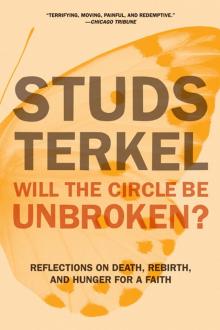 Will the Circle Be Unbroken?
Will the Circle Be Unbroken?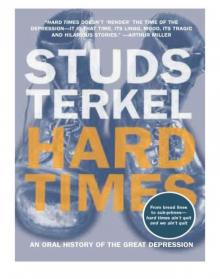 Hard Times
Hard Times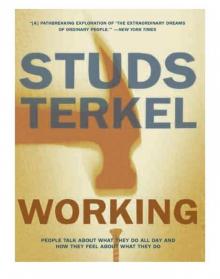 Working
Working Touch and Go
Touch and Go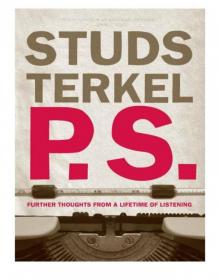 P.S.
P.S.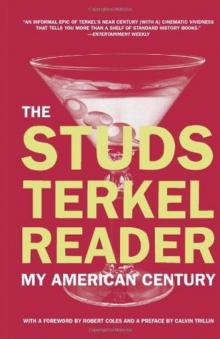 The Studs Terkel Reader_My American Century
The Studs Terkel Reader_My American Century